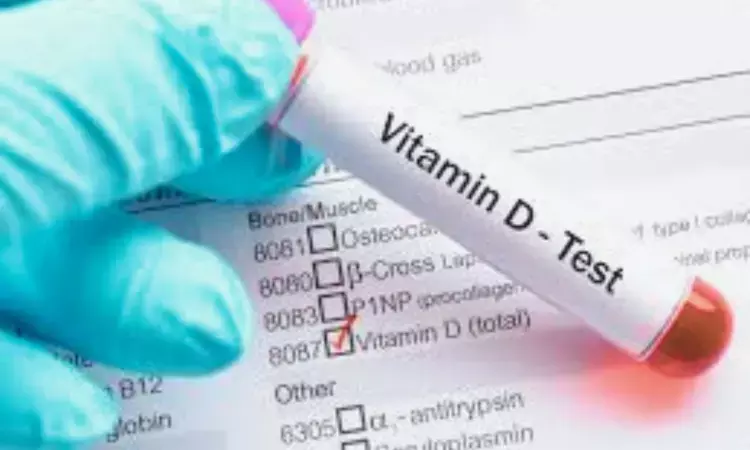- Home
- Medical news & Guidelines
- Anesthesiology
- Cardiology and CTVS
- Critical Care
- Dentistry
- Dermatology
- Diabetes and Endocrinology
- ENT
- Gastroenterology
- Medicine
- Nephrology
- Neurology
- Obstretics-Gynaecology
- Oncology
- Ophthalmology
- Orthopaedics
- Pediatrics-Neonatology
- Psychiatry
- Pulmonology
- Radiology
- Surgery
- Urology
- Laboratory Medicine
- Diet
- Nursing
- Paramedical
- Physiotherapy
- Health news
- Fact Check
- Bone Health Fact Check
- Brain Health Fact Check
- Cancer Related Fact Check
- Child Care Fact Check
- Dental and oral health fact check
- Diabetes and metabolic health fact check
- Diet and Nutrition Fact Check
- Eye and ENT Care Fact Check
- Fitness fact check
- Gut health fact check
- Heart health fact check
- Kidney health fact check
- Medical education fact check
- Men's health fact check
- Respiratory fact check
- Skin and hair care fact check
- Vaccine and Immunization fact check
- Women's health fact check
- AYUSH
- State News
- Andaman and Nicobar Islands
- Andhra Pradesh
- Arunachal Pradesh
- Assam
- Bihar
- Chandigarh
- Chattisgarh
- Dadra and Nagar Haveli
- Daman and Diu
- Delhi
- Goa
- Gujarat
- Haryana
- Himachal Pradesh
- Jammu & Kashmir
- Jharkhand
- Karnataka
- Kerala
- Ladakh
- Lakshadweep
- Madhya Pradesh
- Maharashtra
- Manipur
- Meghalaya
- Mizoram
- Nagaland
- Odisha
- Puducherry
- Punjab
- Rajasthan
- Sikkim
- Tamil Nadu
- Telangana
- Tripura
- Uttar Pradesh
- Uttrakhand
- West Bengal
- Medical Education
- Industry
Vitamin D Supplementation Shows Potential Benefit in MAFLD Management: Study

A new study published in the journal of BMC Endocrine Disorders showed that individuals with metabolic dysfunction-associated fatty liver disease (MAFLD) have significantly lower serum vitamin D levels, which further decline with disease severity. This suggests that vitamin D supplementation may aid in the treatment and management of MAFLD.
The frequency of non-alcoholic fatty liver disease is rising globally and has been identified as the most prevalent metabolic liver disease in Western nations. In line with the prevalence of the metabolic syndrome, Younossi et al. found that its prevalence was highest (32%) in the Middle East. Additionally, 7% of people of normal weight have NAFLD.
The symptoms of various hepatic conditions, from basic hepatic steatosis to steatohepatitis and fibrosis, liver cirrhosis, and even HCC, are what define it. NAFLD has a high correlation with metabolic syndrome and diabetes mellitus. Once MAFLD is established, it raises the hepatic IR, which in 30–40% of instances can lead to hepatocellular cancer, liver cirrhosis, NASH, and hepatic cell failure.
Type 2 diabetes, metabolic disorders, and MAFLD are among the problems associated with insulin resistance that are associated with low blood vitamin D levels. Regarding the relationship between vitamin D and fatty liver, several clinical trials have examined the effectiveness of vitamin D supplementation in individuals with MAFLD, with varying degrees of controversy. Assessing the relationship between blood VIT D levels and insulin resistance in individuals with MAFLD was the goal of this investigation.
A clinical examination comprising anthropometric measurements, laboratory tests (serum VIT D, CBC, metabolic profile, liver and renal function, and HOMA-IR), ultrasonography, and shear wave elastography was conducted on all 120 subjects (60 control and 60 MAFLD patients) in this cross-sectional observational study.
Serum vitamin D levels in MAFLD patients were substantially lower (55%) than in the non-MAFLD group (15%), and they also declined significantly as the grades of fibrosis and steatosis rose (P < 0.001). Furthermore, although it is not statistically significant, there is a negative connection between IR and blood vitamin D levels in MAFLD patients.
Overall, hypovitaminosis D is prevalent in the MAFLD community and may have a role in the development of disease. To determine if vitamin D supplementation is beneficial in improving MAFLD further studies are required.
Reference:
Hassnine, A. A., Elsayed, A. M., Abdelaziez, S. K., Higazi, M. M., Okaily, N. I., & Soliman, W. (2025). Relationship between level of serum VIT D and insulin resistance in patients with MAFLD. BMC Endocrine Disorders, 25(1), 176. https://doi.org/10.1186/s12902-024-01820-0
Neuroscience Masters graduate
Jacinthlyn Sylvia, a Neuroscience Master's graduate from Chennai has worked extensively in deciphering the neurobiology of cognition and motor control in aging. She also has spread-out exposure to Neurosurgery from her Bachelor’s. She is currently involved in active Neuro-Oncology research. She is an upcoming neuroscientist with a fiery passion for writing. Her news cover at Medical Dialogues feature recent discoveries and updates from the healthcare and biomedical research fields. She can be reached at editorial@medicaldialogues.in
Dr Kamal Kant Kohli-MBBS, DTCD- a chest specialist with more than 30 years of practice and a flair for writing clinical articles, Dr Kamal Kant Kohli joined Medical Dialogues as a Chief Editor of Medical News. Besides writing articles, as an editor, he proofreads and verifies all the medical content published on Medical Dialogues including those coming from journals, studies,medical conferences,guidelines etc. Email: drkohli@medicaldialogues.in. Contact no. 011-43720751


